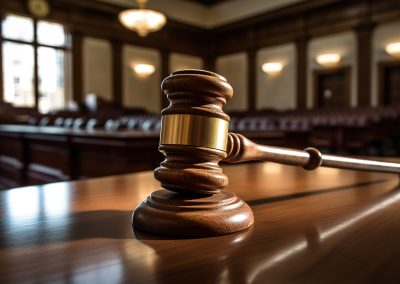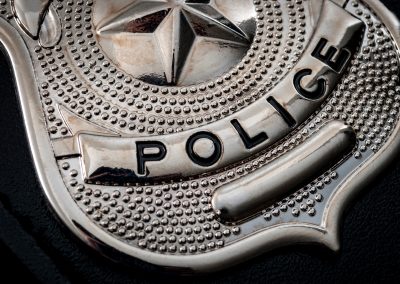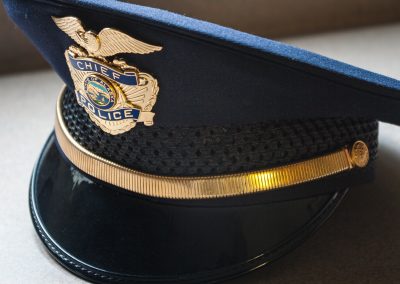By Capt. David Brown
It was a rainy day in the downtown area. As I neared my office, the windshield was battered by rain. With reduced visibility, I barely saw the man.
He had stepped out into the roadway, not at a designated crosswalk, and stopped in the middle of the street. He was wearing a suit and tie and appeared to be hurrying into his office.
The sight of the moment gave me great pause. The man had stopped in the roadway because during the morning storm that besieged the downtown; the associated winds had turned his umbrella inside out. This seemingly annoying inconvenience nearly turned fatal for him. The man had stopped, in low visibility, in the middle of the street, on a busy workday to attempt to fix his umbrella. As traffic barreled at him, he was seemingly unaware of the downstream consequences of his action. He was committing the very action that modern leaders fall victim to every day.
He was too focused on the task to see the world around him. He was the proverbial “missing the forest through the trees” character we talked about.
In policing, we are often so focused on the immediate details of a situation that we can miss the bigger picture. This can have downstream consequences that impact public safety, community relations, and even our careers.
Why police leaders need to see the big picture
Police leaders must possess the ability to take a step back and look at a situation from a ministerial perspective in order to serve their departments successfully. It is too easy as an officer to fall into the trap of acting because it feels right. We have all been there. Throughout our entire careers, we have been the authority on every call. We make decisions for others and give orders to have them followed. Often without question.
A law enforcement leader needs to have the big picture of the entire operation in mind in order to prioritize, plan and allocate resources effectively. Taking a moment to make the right call is better than rushing in and abruptly acting.
Without taking into account all of the small details that impact police operations, any leader risks being unable to act efficiently and clearly. This means mentally stepping back and asking questions.
Why are we here to begin with?
What is our desired outcome?
Consequences
When we do not take the time to consider the big picture of a situation, we often miss out on potential solutions and opportunities. We might focus on smaller details without understanding how they fit into the broader scheme of things, leading to inefficient use of resources and missed chances for success.
I have seen training sergeants jump to get the entire department trained by sending the department to a class as quickly as possible. The problem, their over-zealousness to get everyone trained leaves gaps in scheduling, causing unnecessary overtime. The result is a drain on resources and morale.
I have witnessed pursuits where the supervisor was so focused on ‘catching the bad guy’ that unnecessary risks were taken by their officers to achieve the task at hand. A better way to handle the pursuit would be to redefine the task environment.
Are we trying to catch the bad guy, or are we trying to keep everyone, including the public, safe?
Apprehension of a suspect is certainly a factor to consider when trying to keep the public safe. However, it is not the only way to keep the public safe. We add additional considerations to our thought processes by simply redefining our desired outcome.
We can avoid lawsuits, low morale, and tragedies when we step back and look at things differently.
Failing to maintain a comprehensive view of how all the pieces work together may prevent us from developing creative ideas or identifying successful actions, instead leaving us with implementations that are not well integrated into our overall goals and direction. Going this route can cost valuable time, money, and staffing, making it even more difficult to reach our desired outcomes. Taking a step back and seeing the full scope is thus critical for achieving success in whatever project or endeavor we undertake.
Tactical Pause
In 2005 Col. John Vermeesch (U.S. Army ret.) learned the concept of the ‘tactical pause.’ Taking a tactical pause ensures that an organization does not get stuck in the quagmire of chaos. By embracing “slow is smooth and smooth is fast,” police organizations can reassess their approach confidently, setting themselves up for strategic success. Taking this time allows them to avoid costly errors from rushed actions.
The tactical pause is the perfect way to communicate, redefine ultimate end goals and ensure that you see the big picture. It is a way to pause and reflect before rushing headlong into what might otherwise be a costly mistake.
Risk mitigation falls to supervisors. Failing to see how everyday decisions can turn disastrous impacts not only careers and departments but the entire profession.
Comments? E-mail us at editor@calibrepress.com
About the author
David Brown is a Captain with the Ohio State Highway Patrol. He has been a motorcycle officer, frontline supervisor, academy instructor, field commander, and leadership development coordinator. He has a bachelor’s degree from the Ohio State University, and a master’s in business administration from Mount Vernon Nazarene University.










0 Comments